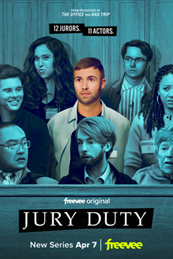 Remember “The Truman Show,” the iconic 90s movie starring Jim Carrey who slowly realizes that his entire life is being filmed against his will and broadcast to a mass audience? Well, imagine that, but make it true this time.
Remember “The Truman Show,” the iconic 90s movie starring Jim Carrey who slowly realizes that his entire life is being filmed against his will and broadcast to a mass audience? Well, imagine that, but make it true this time.
The setting:
Los Angeles. Fourteen people are called in for jury duty. Jury duty is part of America’s judicial system where randomly selected U.S. citizens are required – unless excused – to appear in court and take part in a case’s verdict.
The cast:
Most importantly, we have our oblivious Truman, Ronald Gladden. Also, there’s James Marsden, known for the movies The X‑Men, The Notebook, and many more. He plays an egocentric version of himself, constantly demanding special celebrity treatment. Because of him, the jurors have to stay in one hotel with no cellphones, secluded from their families and friends during the two weeks of the trial. This is quite a clever way of letting Ronald and the characters grow closer, showcase their quirks, and secure more intimate footage.
Joining James Marsden’s character is Noah, a devoted Mormon who tries to navigate his strict religion and the newly-found attention of fellow juror – chaotic, flirty Jeannie. Then there’s Todd who, fascinated by cybernetics, shows up in court with many impractical inventions, for example his “chair-pants.” Both the defendant’s lawyer and the witnesses are comically incompetent. Now release Ronald into this group of strange personas, let it derail into chaos, and there you have it: eight episodes of hilarious, unique entertainment.
Every actor in the show is fantastic. Their ability to stay in character for so long and improvise is remarkable. Ronald, seemingly one of the kindest and most patient people ever, uplifts the show to a whole new level. Take Todd, “the nerd.” He was placed in the cast specifically to unnerve Ronald. Instead, Ronald encourages him and even shows him the movie A Bug’s Life, claiming: “I showed him that movie to kinda let him know that, you know, those people tend to be misunderstood in society […], all he’s [Todd] trying to do is help in his own way.”
For his participation in the show, Ronald was given $100,000. He was able to object to scenes he didn’t want aired and speaks fondly of the cast. Sounds nice, right? However, there are more and more people online questioning the morality of the show. For over two weeks, Ronald thought he’d been forming genuine connections. Yet, neither the conversations nor the people were real. What if he had entrusted personal information to someone? Yes, it probably wouldn’t have appeared on TV. But with the crew watching, it also wouldn’t have stayed just between Ronald and the actor he confided in. Massively limiting his contact with family and friends certainly made him more vulnerable.
Ronald was told a documentary was being filmed, so at least he knew about the cameras in court and for interviews. Yet those were only a fraction of the recordings used. After the trial, Ronald experienced paranoia. He thought he was being followed and secretly filmed all the time. Hidden cameras aside, consenting to be a small part of a documentary just isn’t the same as unknowingly becoming the main character of a highly popular show.
Even if Ronald had wanted to scrap everything, would he have been able to? With Amazon and an entire production team behind the show, having invested lots of time and money? From what we see in interviews, Ronald seems happy with the experience. I still think it’s important to, at least once, think about the ethical dilemma and power imbalance behind it all. I’m happy that it went well in this case.
It’s unlikely that you’re accidentally going to become the star of a popular TV show. (Although that’s probably what Ronald thought too, and here we are). Becoming a hero (or anti-hero) on TikTok, the very platform that made the show as famous as it is, is much more likely. Filming strangers in public and uploading the videos on TikTok without consent has become completely normal. These videos can be positive (e.g., showcasing a cool outfit), negative (e.g., catching a snippet of someone’s personality off-guard and judging them relentlessly) or anything in between (e.g., making up scenarios about the people filmed). They all have one thing in common: These people did not ask to be filmed, let alone go viral. This time it isn’t a planned TV show like Jury Duty, it’s us, regular people trying to go viral. There’s a great Buzzfeed article about the topic, in which the author refers to it as Panopticontent. The word combines content with Jeremy Bentham’s philosophical concept of the Panopticon, a prison in which every prisoner can be observed at all times. Fitting, isn’t it?
If you want to learn more about ways in which being secretly recorded can affect people’s lives, here’s an interesting compilation by YouTuber Salem Tovar:
We all deserve to live life without the constant fear of being filmed. Let’s normalize minding our own business and not using innocent people around us as steppingstones for our fifteen minutes of fame. Let’s not create any more Trumans, please.
7,148 Total Views, 11 Views Today






